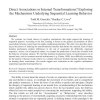Free Online Productivity Tools
i2Speak
i2Symbol
i2OCR
iTex2Img
iWeb2Print
iWeb2Shot
i2Type
iPdf2Split
iPdf2Merge
i2Bopomofo
i2Arabic
i2Style
i2Image
i2PDF
iLatex2Rtf
Sci2ools
106
click to vote
COGSCI
2010
2010
Direct Associations or Internal Transformations? Exploring the Mechanisms Underlying Sequential Learning Behavior
We evaluate two broad classes of cognitive mechanisms that might support the learning of sequential patterns. According to the first, learning is based on the gradual accumulation of direct associations between events based on simple conditioning principles. The other view describes learning as the process of inducing the transformational structure that defines the material. Each of these learning mechanisms predicts differences in the rate of acquisition for differently organized sequences. Across a set of empirical studies, we compare the predictions of each class of model with the behavior of human subjects. We find that learning mechanisms based on transformations of an internal state, such as recurrent network architectures (e.g., Elman, 1990), have difficulty accounting for the pattern of human results relative to a simpler (but more limited) learning mechanism based on learning direct associations. Our results suggest new constraints on the cognitive mechanisms supporting seque...
| Added | 09 Dec 2010 |
| Updated | 09 Dec 2010 |
| Type | Journal |
| Year | 2010 |
| Where | COGSCI |
| Authors | Todd M. Gureckis, Bradley C. Love |
Comments (0)

